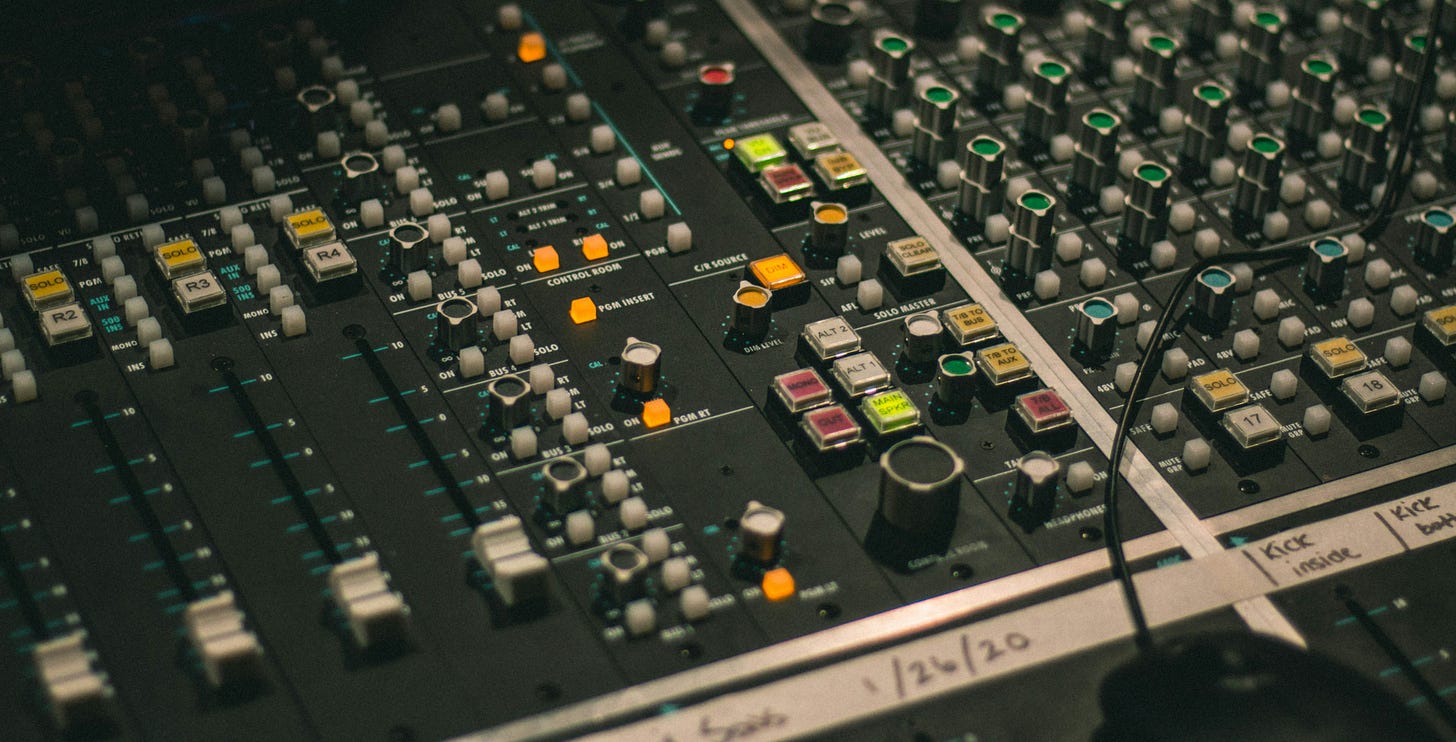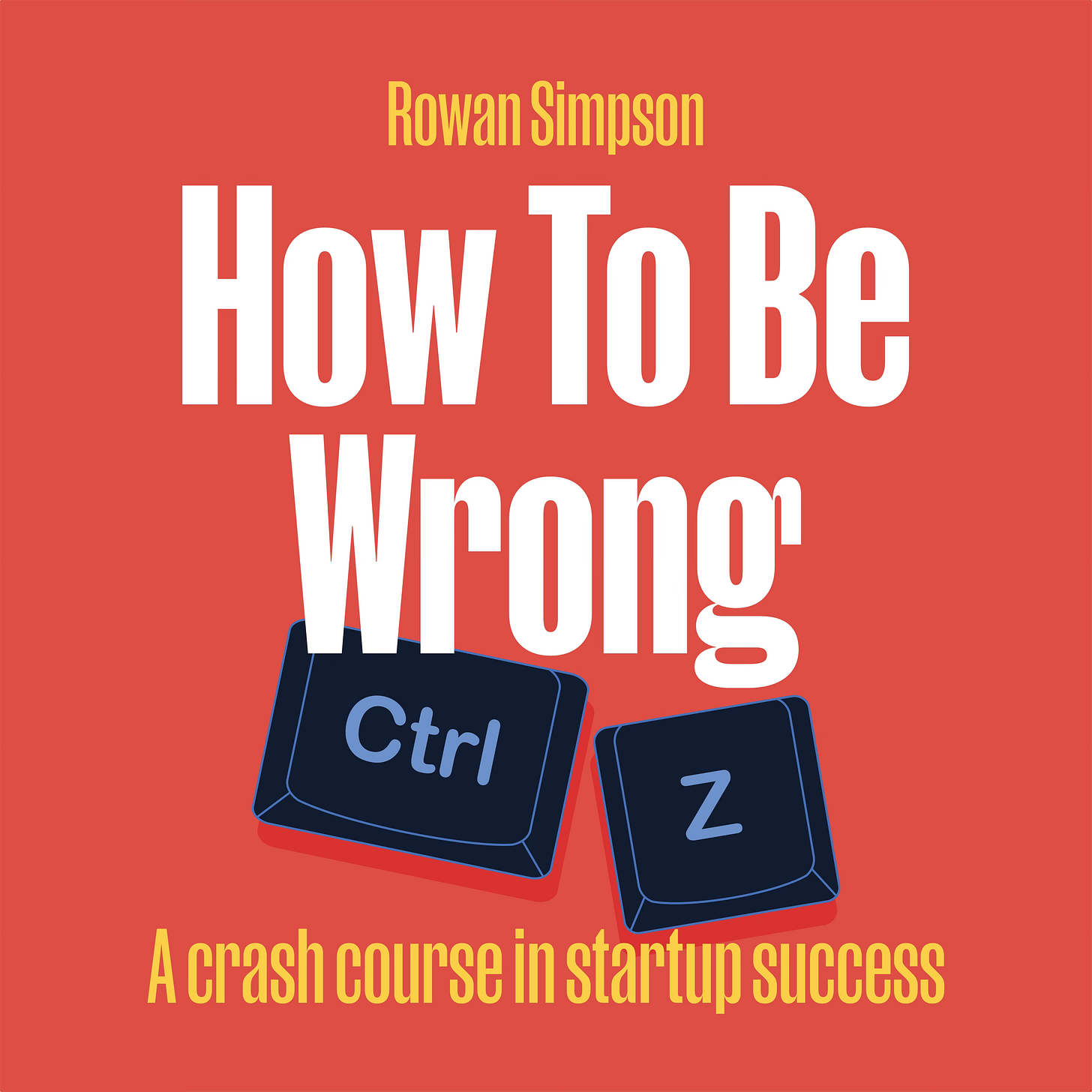27th July, 2025
🎧 Listen, 🎙️Record, 🐴 Persist
🎧 Listen
When How To Be Wrong was published earlier in the year one of the things that surprised me was how many people asked when the audiobook version would be available. It turns out, many more people listen to books than I had appreciated.
I did initially intend to release the audiobook at the same time as the paperback and ebook versions. It was 80% recorded in January. But I didn’t quite get it finished and subsequently it got bumped behind other priorities.
So, I’m excited to finally have this completed. It’s available now on most platforms where you would normally get your audiobooks, including Spotify, Google Play and Apple Books.
If you have a Spotify Premium subscription it’s available to you at no extra charge. And, it should hopefully appear on Audible very shortly - so look out for it there too.
I’d love to hear what you think once you’ve had a listen.
The full book is 10 hours 57 minutes long (I guess shorter if you prefer 1.5x speed). But, if you want something a bit more compressed, here are three podcasts I’ve recently been on where I’ve had the opportunity to talk about the book and some of the themes in it:
Business is Boring with Simon Pound
This is my second appearance on this podcast.1 This time, Simon asked me to share in advance some of the questions that I hadn’t been asked yet in all of the media interviews I’ve done about the book. As a result the signal-to-noise ratio was high. Even if you’ve listened to other podcasts I’ve recorded recently you’ll likely find something new in this - for example, in the second half we go deep on the lessons from the Vend implosion in 2015, when Simon himself had a front-row seat as an employee at the time.
Between Two Beers with Steven Holloway & Seamus Marten
This was a rare treat to be on a podcast with such a large audience. Steven and Seamus are famous for being the best prepared long-form interviewers in the land, and this episode was no exception - right from the very first question.
I’ve had some great feedback about this one and I hope you find it entertaining, useful and interesting. If you have friends who are not normally interested in startup content, but who you think might be curious, this would be a great link to share with them.
Beyond the Surface with Noa Woolloff
In this conversation we go deep on “tall poppy syndrome” and why I think that we often use that as an excuse in NZ, my approach to picking which companies to invest in (and, more importantly, which companies not to invest in) and many of the persistent myths that hold us back from creating more high-growth startups.
Enjoy!
🎙️Record
I was recently invited to join a zoom call with a large group of attendees. I was immediately confronted with an announcement: “This call is being recorded”. It wasn't a question or request for consent—it was a fait accompli. I instinctively turned my camera off and found myself less inclined to participate in the conversation.
Sure enough, and as I had maybe subconsciously feared, shortly after the call snippets surfaced on social media as content to promote the services offered by the people who had coordinated the group. That felt pretty gross.
This isn’t unusual. I’ve noticed that every meeting I’m in now has a few extra attendees—AI agents, who listen to everything that’s said, and afterwards condense that into a transcript, summary and ideally some follow-up actions. Sometimes they are obvious. Sometimes they are lurking in the background.
These tools have started to get remarkably accurate—in just the last few days I’ve gotten meeting summaries from Google, Zoom and even Slack which accurately captured the key points from the just completed conversations. I’ve even found myself occasionally talking directly to the AI agents on the call—for example, to emphasise an action that I want to be recorded.
On the surface it seems amazing and a little bit magical. However, I wonder: at what cost? The implications ripple across multiple dimensions of our working lives:
What is the impact of every conversation being recorded?
Does it change how the humans on the call engage? (And, if it does, how would you know?)
Are the promised productivity improvements real, or do we all now drown in a swamp of transcripts from calls that we’ll never have the time to revisit?
What happens when AI summaries become the official record of meetings? When disputes arise about what was actually said or agreed upon, do we defer to the AI's interpretation over human memory and notes? How do we handle situations where the AI misses crucial context, tone, or subtext that fundamentally changes the meaning of what was discussed? Formal boards use a deliberate process of reviewing and adopting minutes from previous meetings to address exactly these risks and concerns, but that's hardly practical for every daily standup or client call.
Should we worry about the privacy implications of uploading all of the information to the cloud, and having so many of our previously confidential conversations added to the soup of data available to large language models? (Or do we naively trust that the companies managing these tools will respect our privacy and keep this information separate—despite their clear financial and competitive incentives to do otherwise?)
What is the appropriate etiquette around requesting permission to record conversations? Does it need to be explicit and automatically announced to everybody at the start by the AI agent (noting how jarring that can be, especially when you’re talking with people you don’t know well or are meeting for the first time)? Or should that be opt-in and dealt with by humans, and only enabled once everybody has consented? Or are there some situations where you’d record the conversation without explicit permission?2
Do you use AI agents on every call, or are you selective about when they are deployed - perhaps keeping some conversations focussed on building relationships with the real humans you’re talking to?
Finally, how should AI agents like this be regulated - or should it be free-for-all? And, even if they should be regulated, how would that actually work? Given that these tools are essentially creating permanent records of workplace conversations that could be used in disputes, searched by employers, or potentially accessed by third parties, do we need explicit laws about consent, data retention, and the rights of meeting participants? To add even more complexity - what happens when these recordings involve attendees in different countries with different privacy laws?
It’s complicated!
I’ve written in the past about the joy of running naked - no, not without clothes, but without a smart watch and associated data logging to manage my pace. On the rare occasions when I do it (usually because I forgot to charge my watch), it forces me to pay much closer attention to how I'm feeling in my body, to manage my energy based on internal cues rather than algorithmic feedback, and ultimately makes me more present in the moment.
I wonder if before too long we’ll savour conversations which are not recorded and boiled down probabilistically by robots in exactly the same way?
🐴 Persist
Here is a fun story…
Haru Urara is a retired Japanese racehorse. During her 6-year career she competed in 113 races and never won a single race.
In fact, her repeated failures actually made her a minor celebrity in Japan. As described on Wikipedia, she became “a symbol of perseverance and tenacity”:
At a race held on March 22, 2004, during the peak of her popularity, more than 13,000 spectators packed the Kochi Racetrack, 3,000 of whom had gathered outside before the gates opened, forcing the track to open 30 minutes earlier than scheduled. Some people waited in line for up to five hours to buy tickets at the "Haru Urara Commemorative Ticket Booth", which was established especially for the event. Fans bet a grand total of ¥121,751,200 [NZ$1.3m] on a Haru Urara victory, an impressive sum, particularly for a horse that had not won once in more than 100 attempts. Despite being ridden by Japan's premier jockey, Yutaka Take, Haru Urara earned her 106th consecutive loss, placing 10th among 11 horses running.
This year she has enjoyed further notoriety after she was used as the inspiration for a character in an obscure anime game called Umamusume: Pretty Derby. As you’d expect the character has the worst possible stats. But that doesn’t deter fans. Haru Urara’s owners opportunistically asked people to donate towards high-quality “refrigerated, highly palatable ryegrass” for the real-life horse (at the slightly outrageous price of ¥6,000 a pop - or around NZ$70 each). So many people tried to donate that it crashed the payment site.
Sometimes losing is just winning in disguise.
Photo by Yassine Khalfalli on Unsplash
The first, from way back in 2017 is still available here: https://thespinoff.co.nz/podcasts/30-11-2017/rowan-simpson-and-his-founder-centric-approach-to-being-a-company-director
I was surprised to discover that, in New Zealand, laws generally permit recording conversations you participate in, even without others' knowledge. However, secretly recording workplace conversations may breach employment good faith obligations and affect the admissibility of recordings as evidence. Of course, while not illegal, covert recording can severely damage trust and have serious workplace consequences. Tread carefully!



